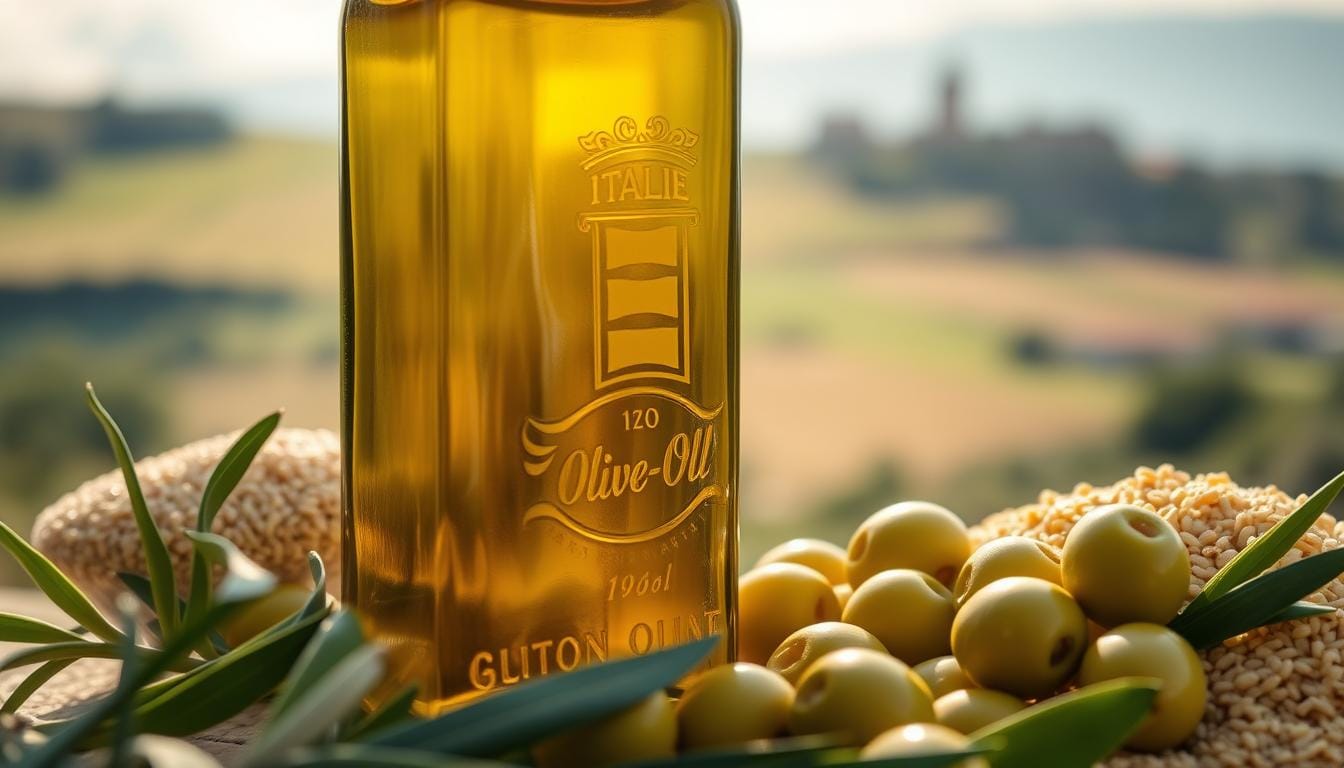For individuals with gluten intolerance or sensitivity, understanding what foods are safe to consume is crucial. One common question that arises is, is olive oil gluten free? This is a vital concern, as olive oil is a staple in many cuisines. In this article, we will delve into the world of olive oil and gluten, exploring the basics of both and what it means for those with gluten restrictions.
As we navigate the complexities of gluten-free diets, it’s essential to know whether olive oil is a safe choice. The question of is olive oil gluten free is not just a matter of personal preference, but a necessity for those who must avoid gluten. With the rise of gluten-free products, it’s easier than ever to find alternatives, but when it comes to olive oil, the answer may not be as straightforward.
Throughout this article, we will discuss the manufacturing process of olive oil, the risks of cross-contamination, and what to look for when selecting a gluten-free olive oil. By the end of this journey, you will have a better understanding of whether olive oil is gluten free and how to make informed choices about this staple in your gluten-free lifestyle.
Key Takeaways
- Understanding the basics of gluten and olive oil is essential for those with gluten intolerance or sensitivity.
- The question of is olive oil gluten free is a critical concern for those with gluten restrictions.
- The manufacturing process of olive oil can impact its gluten-free status.
- Cross-contamination is a risk in olive oil production, and proper precautions must be taken.
- Selecting a certified gluten-free olive oil can provide peace of mind for those with gluten intolerance or sensitivity.
- Being informed about olive oil and gluten can help individuals make better choices about their diet.
- Is olive oil gluten free? The answer will be revealed as we explore the world of olive oil and gluten.
Understanding the Basics: Is Olive Oil Gluten Free?
To determine if olive oil is gluten free, it’s essential to understand the basics of gluten and olive oil. Gluten is a protein found in certain grains, such as wheat, barley, and rye. Olive oil, on the other hand, is a natural oil extracted from olives, typically grown in regions like Italy, Greece, and Spain.
When considering gluten free olive oil, it’s crucial to examine the natural properties of olive oil. Olive oil is naturally gluten-free, as it is derived from olives, which do not contain gluten. However, the risk of cross-contamination with gluten during the production process is a concern. This is where the importance of choosing a reputable brand that follows strict production guidelines comes into play.
What is Gluten?
Gluten is a protein that can cause adverse reactions in individuals with gluten intolerance or sensitivity. There are different types of gluten, including gliadin, glutenin, and hordein, each with distinct effects on the body. Understanding the different types of gluten can help individuals make informed choices about the products they consume, including gluten free olive oil.
Natural Properties of Olive Oil
Olive oil is known for its distinct flavor and numerous health benefits. The natural properties of olive oil make it an ideal choice for those seeking a gluten-free alternative. With its high levels of monounsaturated fats and antioxidants, olive oil can be a valuable addition to a gluten-free diet.
Chemical Composition Analysis
A chemical composition analysis of olive oil reveals its unique properties. Olive oil is primarily composed of fatty acids, including oleic acid, linoleic acid, and palmitic acid. This composition contributes to its distinct flavor and nutritional profile, making it an excellent choice for those seeking gluten free olive oil.
In summary, understanding the basics of gluten and olive oil is crucial for making informed choices about gluten free olive oil. By examining the natural properties of olive oil and its chemical composition, individuals can confidently choose a high-quality, gluten-free olive oil that meets their dietary needs.
The Manufacturing Process of Pure Olive Oil
The production of pure olive oil involves a meticulous process, from harvesting to bottling. To minimize the risk of gluten contamination, manufacturers must adhere to strict handling and storage protocols. The process typically begins with harvesting, where olives are carefully selected and collected to ensure optimal quality.
There are various methods of olive oil production, including cold-pressing and mechanical extraction. Each method has its own set of advantages and potential risks of gluten contamination. For instance, some manufacturers may use shared equipment or facilities that also process gluten-containing products, which can increase the risk of cross-contamination.
To ensure the purity of olive oil and minimize the risk of gluten contamination, it is essential to choose a reputable manufacturer that follows proper handling and storage procedures. Some key factors to consider when selecting an olive oil brand include:
- Production methods and equipment used
- Facility and equipment cleaning protocols
- Storage and handling procedures
- Certifications and compliance with regulatory standards
By understanding the manufacturing process of pure olive oil and the potential risks of gluten contamination, consumers can make informed choices when selecting an olive oil brand that meets their dietary needs.
Cross-Contamination Risks in Olive Oil Production
Olive oil is generally considered gluten-free, but there are risks of cross-contamination during production. This can occur when olive oil is processed in facilities that also handle gluten-containing products, such as wheat or barley. To minimize these risks, it is essential to understand the potential sources of gluten contamination and take preventive measures.
Factory Processing Concerns
Factory processing is a critical stage where cross-contamination can occur. Olive oil producers must ensure that their equipment and facilities are properly cleaned and sanitized to prevent the introduction of gluten. Some key considerations include:
- Separate processing lines for gluten-free and gluten-containing products
- Regular cleaning and sanitation of equipment and facilities
- Training personnel on gluten-free handling and processing procedures

Storage and Bottling Considerations
Proper storage and bottling procedures are also crucial in preventing cross-contamination. Olive oil producers should store gluten-free olive oil in separate areas from gluten-containing products and use dedicated bottling lines to fill and package their products.
Prevention Measures
To ensure the gluten-free status of olive oil, producers can implement various prevention measures, such as regular testing for gluten and certification from reputable organizations. By taking these steps, olive oil producers can minimize the risks of cross-contamination and provide high-quality, gluten-free products to consumers.
Different Types of Olive Oil and Their Gluten Status
Olive oil is a staple in many cuisines, and its gluten content is a concern for those with gluten intolerance or sensitivity. The gluten content in olive oil can vary depending on the type of olive oil. Extra virgin olive oil, for example, is less likely to have gluten content in olive oil due to its minimal processing. On the other hand, refined olive oil may have a higher risk of gluten contamination due to the processing methods used.
When it comes to gluten content in olive oil, it’s essential to consider the processing and handling of the oil. Proper labeling and certification can help ensure that the olive oil meets gluten-free standards. Some types of olive oil, such as cold-pressed or unfiltered olive oil, may have a lower gluten content in olive oil due to their minimal processing.
Here are some key points to consider when choosing an olive oil with low gluten content in olive oil:
- Extra virgin olive oil: low risk of gluten contamination
- Virgin olive oil: moderate risk of gluten contamination
- Refined olive oil: higher risk of gluten contamination
In summary, the gluten content in olive oil can vary depending on the type of olive oil and its processing. By choosing a high-quality olive oil with proper labeling and certification, individuals with gluten intolerance or sensitivity can enjoy the benefits of olive oil while minimizing their risk of gluten exposure.
Certified Gluten-Free Olive Oil Brands
For individuals with gluten intolerance or sensitivity, choosing the right olive oil can be a challenge. To ensure that the olive oil is gluten-free, it’s essential to look for certified brands. The question of is olive oil gluten free can be answered by checking the certification standards and processes. In the US market, several top brands offer gluten free olive oil options.
When shopping for gluten-free olive oil, it’s crucial to read labels carefully. Here are some tips to keep in mind:
- Check for certification from reputable organizations, such as the Gluten-Free Certification Organization (GFCO) or the Celiac Support Association (CSA)
- Look for the “gluten-free” label on the packaging
- Be aware of cross-contamination risks during production and processing
Some top certified brands in the US market include:
- California Olive Ranch
- Lucini
- McEvoy Ranch
By choosing a certified gluten free olive oil brand, individuals with gluten intolerance or sensitivity can enjoy the health benefits of olive oil without worrying about gluten contamination. Always remember to check the label and look for certification to ensure that the olive oil is is olive oil gluten free.
Cooking with Olive Oil on a Gluten-Free Diet
When it comes to cooking with olive oil on a gluten-free diet, there are several benefits to consider. Olive oil is a healthy and versatile ingredient that can be used in a variety of dishes, from salads to sautéed vegetables. One of the main advantages of using olive oil in gluten-free cooking is its ability to add flavor and moisture to dishes without introducing gluten.
Here are some tips for cooking with olive oil on a gluten-free diet:
- Use olive oil as a substitute for other oils in recipes
- Choose a high-quality olive oil that is rich in antioxidants and has a mild flavor
- Be mindful of cross-contamination with gluten when cooking with olive oil
In addition to its culinary uses, olive oil also has several health benefits that make it an excellent choice for those with gluten sensitivities. It is rich in healthy fats and antioxidants, which can help to reduce inflammation and improve overall health. By incorporating olive oil into your gluten-free diet, you can enjoy the benefits of healthy and delicious cooking.
Health Benefits of Olive Oil for Gluten-Sensitive Individuals
Olive oil is a nutritious addition to a gluten-free diet, offering numerous health benefits for gluten-sensitive individuals. When considering gluten in olive oil, it’s essential to understand that high-quality olive oil is naturally gluten-free. The nutritional profile of olive oil is rich in healthy fats, antioxidants, and vitamins, making it an excellent choice for those with gluten intolerance or sensitivity.
The anti-inflammatory properties of olive oil can help alleviate symptoms associated with gluten sensitivity, such as digestive issues and joint pain. Regular consumption of olive oil has been shown to reduce inflammation and improve overall health. Additionally, olive oil supports digestive health by promoting the growth of beneficial gut bacteria, which is crucial for individuals with gluten sensitivity.
Nutritional Profile
- Rich in healthy fats, including monounsaturated and polyunsaturated fats
- High in antioxidants, such as vitamin E and polyphenols
- Good source of vitamins K and E
Anti-inflammatory Properties
Olive oil contains a compound called oleocanthal, which has potent anti-inflammatory properties, similar to those found in ibuprofen. This makes olive oil an excellent choice for reducing inflammation and alleviating symptoms associated with gluten sensitivity.
Digestive Health Benefits
Olive oil can help soothe and protect the digestive tract, reducing the risk of complications associated with gluten sensitivity. By incorporating olive oil into a gluten-free diet, individuals can promote digestive health and reduce inflammation.
Common Misconceptions About Olive Oil and Gluten
When it comes to olive oil and gluten, there are several misconceptions that need to be addressed. One of the most common misconceptions is that all olive oil is gluten-free. While olive oil is naturally gluten-free, the gluten content in olive oil can be affected by cross-contamination during the production process.
Some people believe that olive oil is completely safe for those with gluten intolerance or sensitivity, but this is not always the case. In reality, the risk of gluten contamination is higher than many people think. To ensure the gluten content in olive oil is minimal, it’s essential to choose a reputable brand that follows proper labeling and certification procedures.
Here are some tips for ensuring the gluten-free status of olive oil:
- Check the label for certification from a reputable organization
- Choose a brand that uses dedicated equipment and facilities to minimize cross-contamination
- Be aware of the potential risks of gluten contamination during storage and transportation
By being aware of these misconceptions and taking steps to minimize the risk of gluten contamination, individuals with gluten intolerance or sensitivity can enjoy the benefits of olive oil while maintaining a gluten-free diet. Remember to always check the label and choose a reputable brand to ensure the gluten content in olive oil is minimal.
Safety Tips for Buying and Using Gluten-Free Olive Oil
When it comes to buying and using gluten-free olive oil, there are several safety tips to keep in mind. First, it’s essential to understand that is olive oil gluten free is a common question, and the answer is yes, as long as it’s produced and handled properly. To ensure you’re getting gluten free olive oil, look for certification from reputable organizations.
Here are some shopping guidelines to follow:
- Check the label for certification from organizations such as the Gluten-Free Certification Organization (GFCO) or the Celiac Support Association (CSA)
- Choose olive oil from reputable manufacturers that follow proper handling and storage procedures
- Be aware of potential cross-contamination risks during production and storage
In addition to shopping guidelines, proper storage and usage are crucial to maintaining the quality and safety of your gluten-free olive oil. Store your olive oil in a cool, dark place, and use it within a reasonable timeframe to prevent spoilage. By following these safety tips, you can enjoy the benefits of gluten free olive oil while minimizing the risk of gluten contamination.

Storage Recommendations
To maintain the quality and safety of your gluten-free olive oil, it’s essential to store it properly. Keep your olive oil away from heat sources, direct sunlight, and moisture. Use a clean and dry container, and make sure it’s tightly sealed to prevent contamination.
Conclusion: Making Informed Choices About Olive Oil in Your Gluten-Free Lifestyle
As you navigate the world of gluten-free living, understanding the role of olive oil is crucial. Olive oil, a staple in many kitchens, is naturally gluten-free, but the potential for cross-contamination during production and packaging requires vigilance.
By educating yourself on the manufacturing process, certification standards, and trusted gluten-free olive oil brands, you can confidently incorporate this versatile ingredient into your meals. Remember, reading labels carefully and following proper storage and usage guidelines are key to ensuring your olive oil remains safe and suitable for your dietary needs.
Embracing the numerous health benefits of olive oil, such as its anti-inflammatory properties and digestive support, can be a valuable addition to your gluten-free lifestyle. With the right knowledge and informed choices, you can enjoy the rich flavor and nutritional advantages of olive oil while maintaining a gluten-free diet that supports your overall well-being.
FAQ
Is olive oil gluten-free?
Yes, pure olive oil is typically gluten-free. Olive oil is made from the pressing of olives, which do not contain gluten. However, there is a risk of cross-contamination during the manufacturing process, so it’s important to look for certified gluten-free olive oil brands.
Can people with gluten intolerance or celiac disease consume olive oil?
Yes, people with gluten intolerance or celiac disease can generally consume pure, uncontaminated olive oil without issue. Olive oil itself does not contain any gluten. However, it’s crucial to ensure that the olive oil has been properly handled and stored to prevent cross-contamination with gluten-containing products.
What are the potential sources of gluten contamination in olive oil?
Gluten contamination in olive oil can occur during the manufacturing process, particularly in the factory processing, storage, and bottling stages. Cross-contamination can happen if the olive oil comes into contact with gluten-containing ingredients or is processed on equipment that has also been used for gluten-containing products.
How can I ensure that the olive oil I’m buying is gluten-free?
To ensure that your olive oil is gluten-free, look for products that are certified as gluten-free by a reputable organization. Check the label for the gluten-free certification seal and be cautious of any olive oil that does not clearly state it is gluten-free. It’s also a good idea to buy from trusted, dedicated gluten-free brands.
What are some top certified gluten-free olive oil brands in the US market?
Some top certified gluten-free olive oil brands in the US market include California Olive Ranch, Ellora Farms, and Lucini Italia. These brands have undergone rigorous testing and certification processes to ensure their olive oils are free from gluten contamination.
Can I cook with gluten-free olive oil on a gluten-free diet?
Yes, you can safely cook with gluten-free olive oil on a gluten-free diet. Olive oil is a great choice for gluten-free cooking, as it adds flavor and moisture to dishes without the risk of gluten contamination. Just be sure to use a certified gluten-free olive oil and take precautions to prevent cross-contamination in the kitchen.
What are the health benefits of using olive oil on a gluten-free diet?
Olive oil offers several health benefits for individuals following a gluten-free diet. It is rich in healthy fats, antioxidants, and anti-inflammatory compounds, which can help support digestive health and reduce inflammation. Olive oil is also a versatile cooking oil that can be used in a variety of gluten-free recipes.
